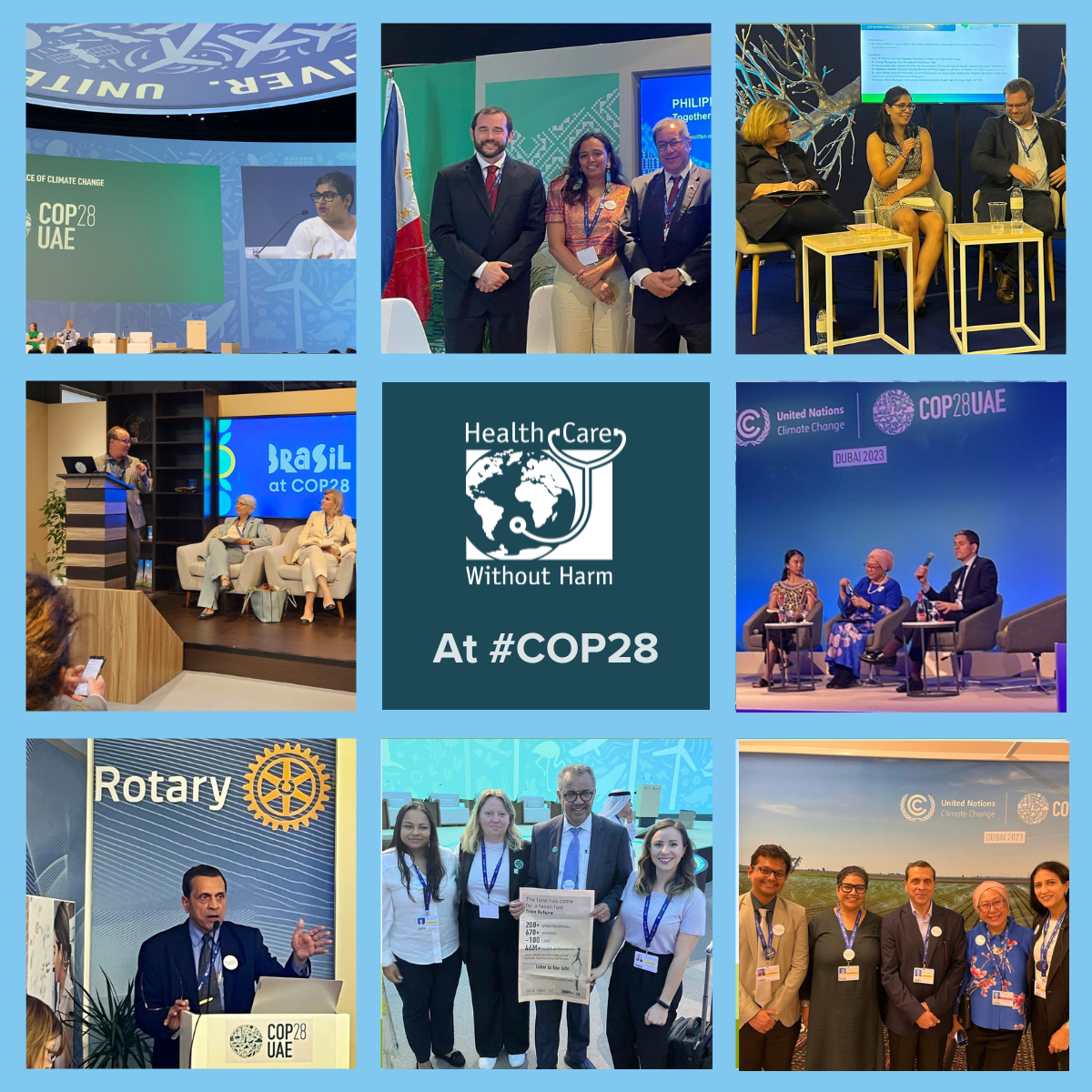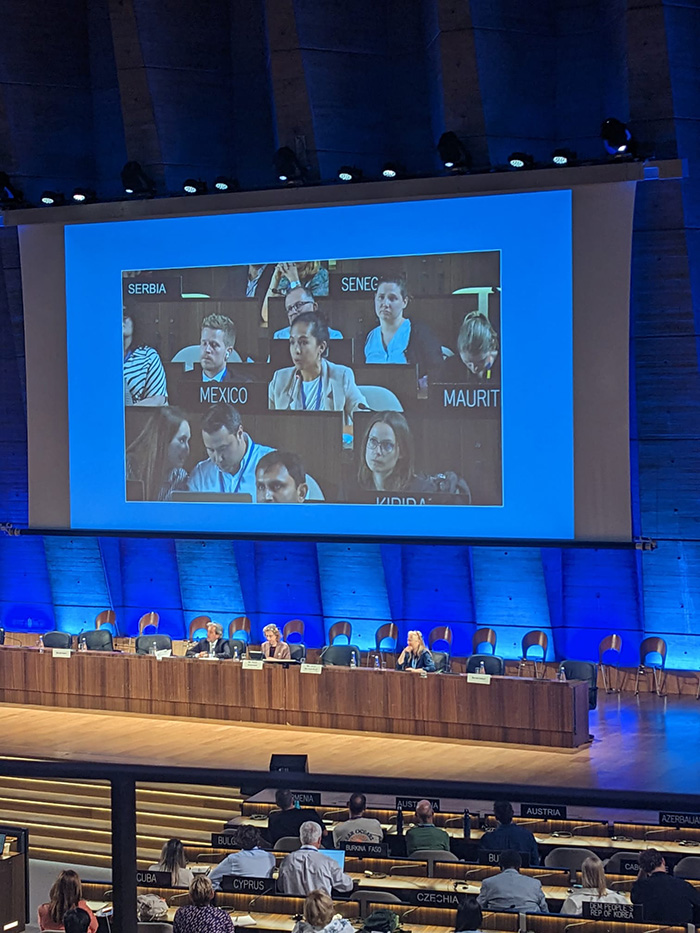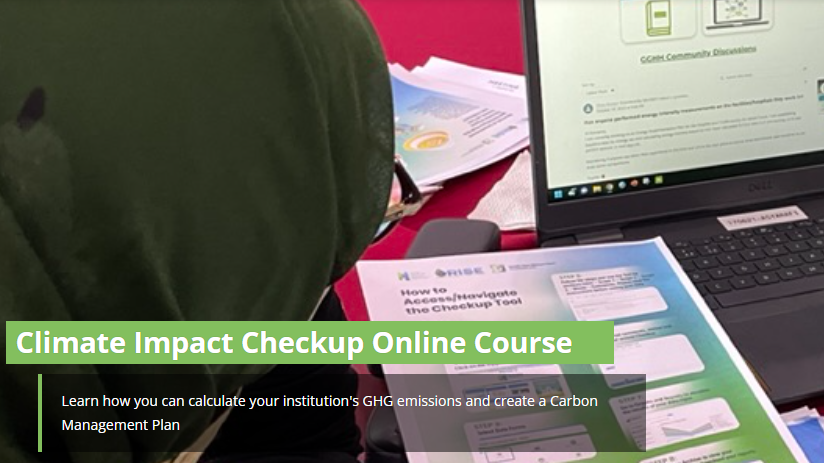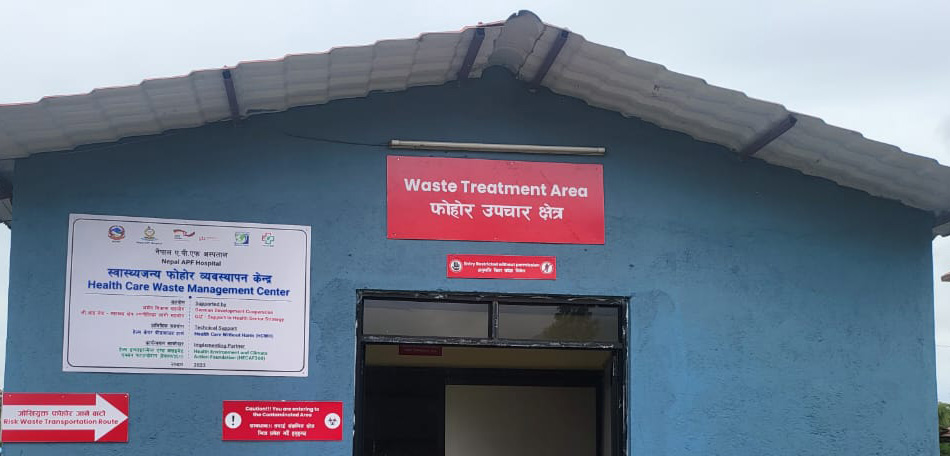2024, and the road ahead
As the world struggles to meet the ambitions of the Paris Agreement, the health care sector is increasingly engaging in practices and activities aimed at decarbonization and building resilience. In 2023, COP28 marked a pivotal milestone with the first-ever Health Day - putting front and center the importance of recognizing the interconnection of climate change and health.
At Health Care Without Harm, we are committed to working side-by-side with governments, hospitals, health systems, and professionals by providing resources and technical assistance to help the sector reach its sustainability and decarbonization goals.
These are some of the highlights of our work in 2023 and the road ahead for the coming years.
Global action
At COP28, we proudly joined forces with partners, assembling a record-diverse 12-person delegation from ten countries, whose advocacy was instrumental in forging a global consensus to transition away from fossil fuels. We participated in the inaugural Health Day plenary session, organized high-level roundtables and official side events, and participated in Health pavilion panels on low carbon, sustainable health systems, and air pollution.

Health Care Without Harm is a member of the Steering Committee of the World Health Organization’s Alliance for Transformative Action for Climate and Health (ATACH), which has the mandate to provide resources and guidance to countries that have committed to the COP26 Health Programme in achieving low carbon, sustainable, and resilient health systems. Resources developed by Health Care Without Harm are available for participants in ATACH’s community of practice platform.
In 2023, the UN Environment Programme (UNEP) Intergovernmental Negotiating Committee (INC) continued its negotiations to craft an international legally binding instrument to end plastic pollution. Our delegations actively participated in the second (INC-2) and third (INC-3) sessions, held in Paris, France, and Nairobi, Kenya, where they advocated for a Treaty that considers the entire life cycle of plastics and emphasizes urgent actions to tackle the health care plastics crisis.
This year, Health Care Without Harm’s global network will continue to engage as observers in the INC negotiations, reinforcing that health must remain a central part of the discussion, including single-use plastics in the health sector.

Our Global network delegation participated in the conversations leading to the adoption, in September 2023, of a historic Global Framework on Chemicals. It outlines a roadmap to address the lifecycle of chemicals, including products and waste in various sectors, such as health care.
In 2023, our leadership in championing a health-focused Just Transition away from fossil fuels was pivotal in shaping discussions at the crossroads of climate, health, and social justice. Prioritizing health considerations laid the foundation for a more inclusive approach to the transition to a sustainable future. As we move into 2024, our commitment remains steadfast. We aim to integrate health further into the Just Transition framework, ensuring decisions prioritize both environmental sustainability and the well-being of communities.
Empowering health professionals for climate action
As the urgency to act intensifies, health professionals are positioned as some of the most trusted voices in society, with a rich history of health advocacy on social issues. In 2023, we launched resources to empower professionals to advocate for equitable, just, and environmentally sound national and local policies. Our guide, Reclaiming Health Activism in the Age of Climate Crisis, harnesses the legacy of health activism, urging a new wave of advocacy centered on climate action. In 2024, Health Care Without Harm will launch a series of webinars and workshops for health care professionals looking for actionable steps for organizing campaigns, hosting public awareness events, and collaborating with other advocacy groups.

In collaboration with the Global Climate and Health Alliance, we coordinated the COP28 Open Letter on fossil fuels, representing over 46 million health care professionals from 135 countries and amplifying the urgent need for a fossil fuel phase-out. This collaboration joined several coalitions, including We Mean Business Coalition, C40 Cities, Climate Crisis Advisory Group, and the Union of Concerned Scientists, to produce a full-page advertisement in the Financial Times to emphasize the urgency of a just and equitable transition away from fossil fuels ahead of COP28.
Expanding our network and alliances
Our Global Green and Healthy Hospitals (GGHH) community experienced significant growth, welcoming 287 new members. Also, and for the first time, organizations from five new countries - El Salvador, Slovakia, Romania, Estonia, and Japan - joined the network. The more than 30 new case studies spotlighting impactful projects by GGHH members worldwide also attested to this dedication to sustainability.
With hospitals and health systems positioning sustainability and the reduction of emissions at the core of their operations, in 2023, 35 new participants signed up for our Health Care Climate Challenge, with representatives joining from four new countries: Kenya, Thailand, United Arab Emirates, and Zambia.

The commitment of the health care sector to the United Nations-backed global campaign Race to Zero remains strong. Since its launch, over 70 institutions from 25 countries have joined this coalition of hospitals and health systems committed to reducing emissions. Collectively, these organizations represent over 14,000 hospitals and health centers worldwide. The progress made by our health system partners in their net zero ambitions was highlighted during an event at COP28, where our delegation engaged with our Race to Zero partners and the private sector.
Resources driving sustainable health care practices
In 2023, we presented a comprehensive online course and training program for our Climate Impact Checkup tool. Within two months of its launch, over 200 participants in 40 countries joined this course, which was developed to help professionals in the health care sector track their institutions’ emissions and design a successful carbon management plan.

In collaboration with our global partners, we launched the Climate Learning Initiative, a project that convened representatives from 98 health care organizations spanning 20 countries. This collaborative endeavor culminated with the publication of our Climate action guide, which brings together insights, lessons learned, and proven practices from participating institutions to achieve decarbonization and climate resilience.
Transformative projects
The Support for Healthcare Waste Management in Kathmandu 2022-2023 project, a collaborative effort by Health Care Without Harm and HECAF360, concluded after 22 months. This initiative enhanced environmental resilience and optimized Nepal's health care waste management practices, equipping hospitals with essential tools, workshops, and resources to manage health care waste effectively.

In 2024, Health Care Without Harm will continue strengthening its global, national, and health system work. Our global network will continue working with health care systems and professionals to bring front and center the conversations on just transition, health equity, and sustainability, as we believe that progress and sustainability cannot be achieved without social justice.
